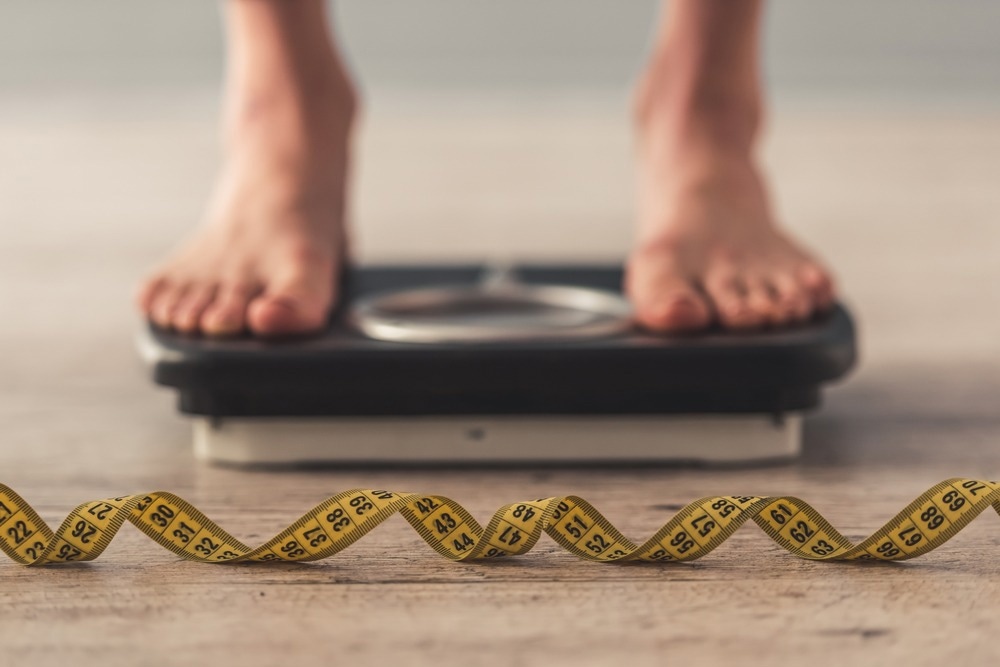A recent study published in the PLOS ONE Journal aimed to determine the association of mental health issues associated with body mass index (BMI) and gender in the oldest old population.

Study: The impact of BMI on psychological health in oldest old individuals–Are there differences between women and men? Image Credit:VGstockstudio/Shutterstock.com
Background
Breath Biopsy®: The Complete Guide eBook

Recently, a high global prevalence of obesity has become a major public health concern. Typically, the obesity rate is lower in the oldest old group (aged 77 to 96 years) compared to the older age group (65 to 74 years of age).
Older age groups with a higher BMI are at an increased mortality risk. This is due to shared comorbidities, such as diabetes, coronary heart disease, and hypertension, between older age and obesity.
Introduction
In tandem with the increase in the age of the general public, it is imperative to evaluate the consequences of extreme weight gain in the oldest old group.
This will help prepare the healthcare system to provide appropriate care and estimate costs. Typically, overweight and obese individuals experience several health complications, including hypertension, coronary heart disease, type 2 diabetes, and mental health issues (e.g., depression and anxiety).
Several studies have indicated that in older people, obesity and being overweight act as protective factors in cardiovascular outcomes, known as the obesity paradox. Also, the effect of the association between obesity and mental health was found to be predominantly in late life rather than early or middle age.
Not much research has analyzed the association between being overweight and obese and mental health in the oldest old. Since currently, the oldest old group is currently a fast-growing population; it is important to analyze this group so that optimal care can be provided to them.
About the study
The data of the current study was obtained from the secondary follow-up of a long-term study that determined the effect of the coronavirus disease 2019 (COVID-19) pandemic on the overall mental health, health, and stress in the oldest old individuals.
This observational study recruited community-dwelling seniors from Leipzig (Germany) during the first wave of the COVID-19 pandemic, i.e., from March to July 2020.
For the second follow-up wave, 170 participants were contacted between the end of 2021 and the beginning of 2022. After analyzing the eligibility criteria, 121 candidates were recruited for the current study.
Study findings
The study cohort comprised 55% female and 44% male, whose mean age was around 86 years. As per BMI estimations, 2.5% were underweight, 47.9% were normal weight, 33.9% were overweight, and 15.7% were obese. A very small percentage of the participants tested positive for COVID-19.
No significant difference was observed between male and female participants regarding age, education, and BMI categories, i.e., underweight, normal weight, overweight, and obesity. However, within the female sub-group, a significant difference was observed concerning anxiety.
Women with excess weight were more susceptible to severe anxiety than those with normal BMI. The obesity paradox was observed in females with BMI below 25.
Interestingly, the BMI category of underweight/normal weight vs. overweight/obese did not significantly affect overall health, independent of gender and social support.
The current study indicated that BMI was significantly related to somatization in both men and women. Anxiety and depression were unrelated to BMI when sociodemographic factors and social supports were controlled.
The current study's findings were inconsistent with previous studies that revealed a link between obesity and depression in women but not men. This result could be because prior studies were based on younger age cohorts.
Conclusions
Two of the key limitations of the current study include its small sample size and self-reported weight and height. In addition, no information related to income or comorbidities (e.g., hypertension and cognitive impairments) were included in this study.
Despite the abovementioned limitations, this study provided insights into the association between BMI and psychological health in the oldest old population. Although compared to other age groups, obesity was found to be lower in the oldest old, a rise has still been recently observed among this group of individuals.
The authors revealed that somatization was the only outcome that was affected by BMI. In the oldest old group prevalence of depression and anxiety was not linked to BMI.
In the future, more research must be conducted to understand the underlying psychological or physiological processes that cause gender differences in the association between BMI and psychological health.
In addition, future studies should analyze the causal relationships based on longitudinal designs, which will help develop appropriate interventions for this vulnerable group.
-
Jung, F. et al. (2023) "The impact of BMI on psychological health in oldest old individuals–Are there differences between women and men?", PLOS ONE, 18(3), p. e0283089. doi: 10.1371/journal.pone.0283089. https://journals.plos.org/plosone/article?id=10.1371/journal.pone.0283089
Posted in: Medical Science News | Medical Research News | Healthcare News
Tags: Anxiety, Body Mass Index, Coronary Heart Disease, Coronavirus, covid-19, Depression, Diabetes, Education, Healthcare, Heart, Heart Disease, Mental Health, Mortality, Obesity, Pandemic, Public Health, Research, Seniors, Somatization, Stress, Type 2 Diabetes

Written by
Dr. Priyom Bose
Priyom holds a Ph.D. in Plant Biology and Biotechnology from the University of Madras, India. She is an active researcher and an experienced science writer. Priyom has also co-authored several original research articles that have been published in reputed peer-reviewed journals. She is also an avid reader and an amateur photographer.
Source: Read Full Article